Overview
The article addresses common concerns that freelancers and small business owners face regarding expense management, emphasizing the critical nature of effective financial oversight. It presents clear, factual information on how utilizing features such as automated receipt scanning and categorization can streamline bookkeeping processes. This means that not only can errors be reduced, but financial oversight can also be significantly enhanced—a vital aspect for independent workers who encounter unique monetary challenges.
Furthermore, the article reinforces the platform's reliability and security through data-driven insights, ensuring readers feel confident in its capabilities.
In conclusion, it invites users to experience the benefits firsthand, encouraging them to try the platform and see how it can transform their financial management practices.
Introduction
In the dynamic landscape of freelancing and small business ownership, effective financial management is not merely a luxury; it is a necessity. As the gig economy continues to expand, millions of individuals navigate the complexities of inconsistent income and the absence of employer-sponsored benefits. This raises significant concerns regarding expense management.
The importance of meticulous expense tracking becomes increasingly evident. This article delves into the critical role that expense management plays in achieving financial stability. Furthermore, it highlights innovative tools like Kulud that simplify the process.
By exploring common financial challenges freelancers face, essential features to look for in an expense tracker, and actionable strategies to optimize financial practices, readers will discover how to take control of their financial health and drive their businesses toward success.
This means that with the right tools and strategies, financial stability is within reach.
Understanding the Importance of Expense Tracking for Freelancers and Small Business Owners
An expense tracker serves as a cornerstone of money management for independent workers and small business proprietors, offering a transparent view of their economic health. By meticulously documenting costs through an expense tracker, individuals can uncover spending patterns, effectively manage their budgets, and ensure compliance with tax regulations. In 2025, statistics indicate that 75% of new independent workers began their careers during an economic downturn, underscoring the necessity for stability through careful budget management.
Moreover, with 1 in 7 self-employed individuals in the UK being mothers, the challenges of balancing work and family obligations highlight the significance of effective financial resources.
The company simplifies financial management with its automated invoice processing and bank transaction matching capabilities. By linking as many email boxes as desired, independent workers can effortlessly gather invoices from both work and personal accounts, while Kulud automatically extracts and categorizes expenses. This automation not only saves time but also enhances fiscal oversight and precision, enabling independent workers to focus on their essential business tasks.
Regular tracking with an expense tracker not only aids in maintaining precise financial records but also empowers independent workers to make informed decisions regarding their business operations. For instance, a self-employed individual who diligently monitors costs can identify areas for savings, ultimately improving profitability. The case study on 'Administrative Tasks of Independent Workers' illustrates that as the workday progresses, independent workers often shift their focus to administrative tasks such as invoicing and tax preparation.
This time is crucial for sustaining their business operations, and organized financial records simplify the tax filing process, significantly minimizing the risk of errors and possible audits.
The importance of cost monitoring is further emphasized by the fact that 51% of independent workers possess postgraduate degrees, indicating a diverse and educated labor force that values financial expertise. As freelancers navigate the dual responsibilities of delivering client work and managing their businesses, effective financial tracking becomes essential. Georgi Knyazhev, a satisfied user, states, "The service has transformed my accounting processes, allowing me to save time and streamline communication with my accountants."
Practical examples demonstrate how cost monitoring can enhance monetary well-being. Freelancers often discover that by utilizing an expense tracker to automate their expense management, they can reclaim valuable time previously spent on administrative tasks such as invoicing and tax preparation. This shift not only enhances their operational efficiency but also allows them to focus on growth and client engagement, ultimately leading to a more sustainable business model.
By using this platform, independent workers can more effectively manage the complexities of their financial obligations, particularly during challenging economic periods. Kulud offers a trial for processing 20 invoices and receipts, with options for unlimited email processing and exports, making it a flexible solution for freelancers.
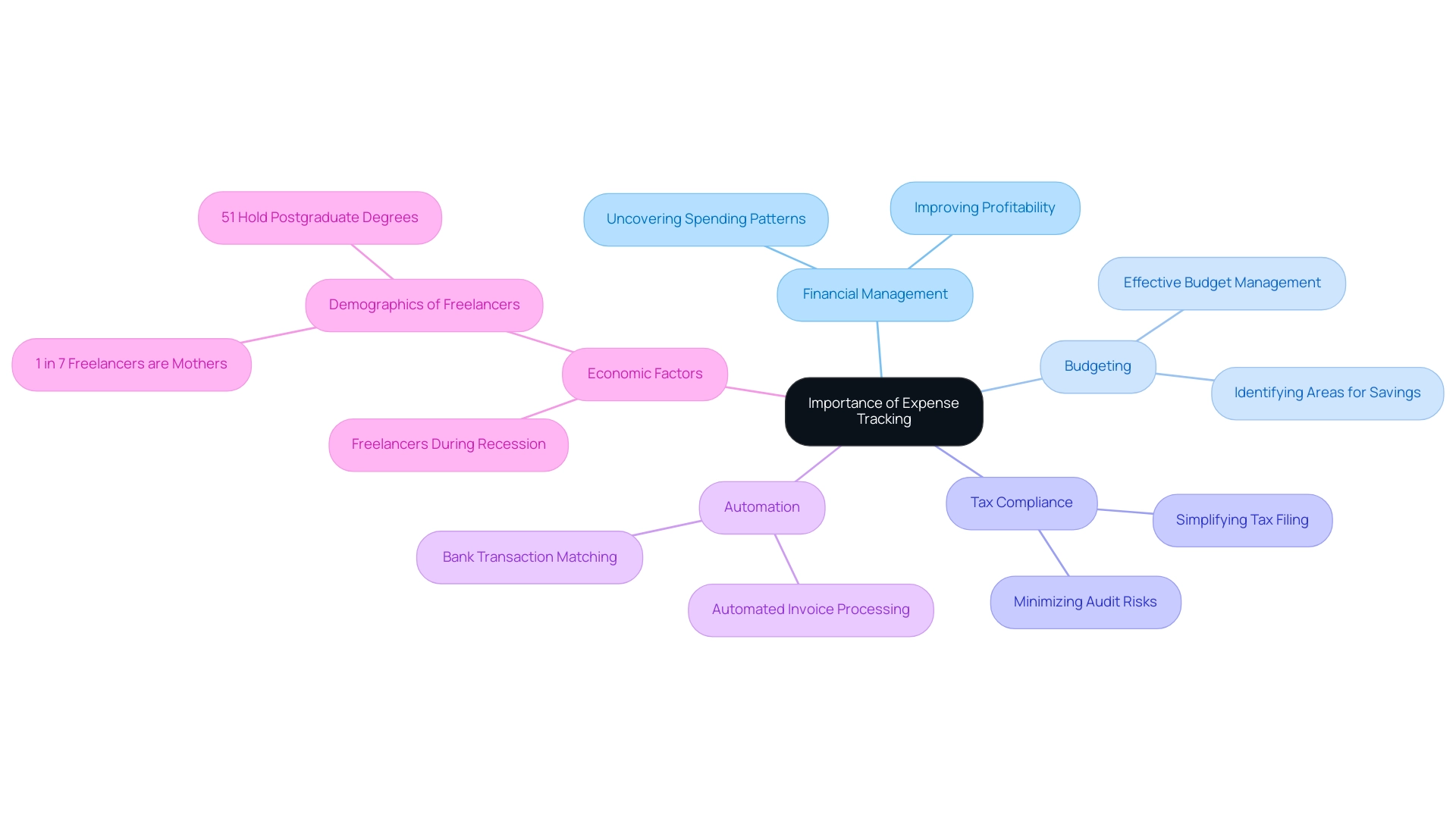
Common Financial Challenges Faced by Freelancers
Freelancers encounter a distinct set of monetary challenges that can significantly impact their business operations. One of the most pressing issues is inconsistent income, complicating budgeting and the effective use of an expense tracker. In 2025, it is projected that 1.57 billion individuals will be freelancing globally, representing 46.7% of the workforce.
This growth highlights the increasing appeal of freelancing, particularly due to its flexibility and the improved work/life balance it offers. However, it also underscores the economic uncertainty many self-employed individuals face. For instance, a considerable number of independent workers report difficulties in managing cash flow due to the unpredictable nature of their earnings.
Moreover, the lack of employer-sponsored benefits adds extra burdens on these individuals. They must independently manage health insurance, retirement savings, and tax obligations, which can lead to financial strain if not handled effectively. In fact, many independent workers find themselves overwhelmed by the complexities of tax preparation, often resulting in last-minute scrambles to meet deadlines.
Statistics reveal that a staggering 84% of hiring managers in the Asia Pacific have outsourced work to self-employed individuals, reflecting a growing reliance on freelance talent. This trend is mirrored by the rapid expansion of the freelance industry in Africa, which comprises around 10% of the global population of self-employed individuals. However, this reliance also means that independent workers must navigate the challenges of fluctuating workloads and payment schedules.
To address these issues, it is essential for independent workers to adopt robust cash flow management strategies. This involves reserving resources during high-income phases to cover costs during slower periods.
Expert insights emphasize the importance of anticipatory financial planning for independent workers. By utilizing tools such as this expense tracker application, which automates tracking of costs and provides insights into spending habits, freelancers can gain better control over their finances. This platform revolutionizes expense management by offering features such as automated categorization of receipts, seamless integration with Gmail for easy email login, and the ability to request missing invoices effortlessly.
Additionally, the individual has successfully completed a Cloud Application Security Assessment (CASA) and has been validated by the App Defense Alliance (ADA), ensuring a high level of security for users. The budget-friendly rates of Kulud further enhance its appeal, making it accessible for independent workers seeking to simplify their money management. This approach not only streamlines the bookkeeping process but also empowers independent workers to make informed choices about their economic future.
Furthermore, the freelance platform industry is expected to expand considerably, reaching $8.39 billion by 2025, further emphasizing the economic significance of this workforce.
In conclusion, understanding the monetary challenges faced by independent contractors is crucial for developing effective strategies that incorporate an expense tracker for cost monitoring and management. By confronting these issues directly with tools like Kulud, independent workers can enhance their financial stability and focus on growing their businesses.
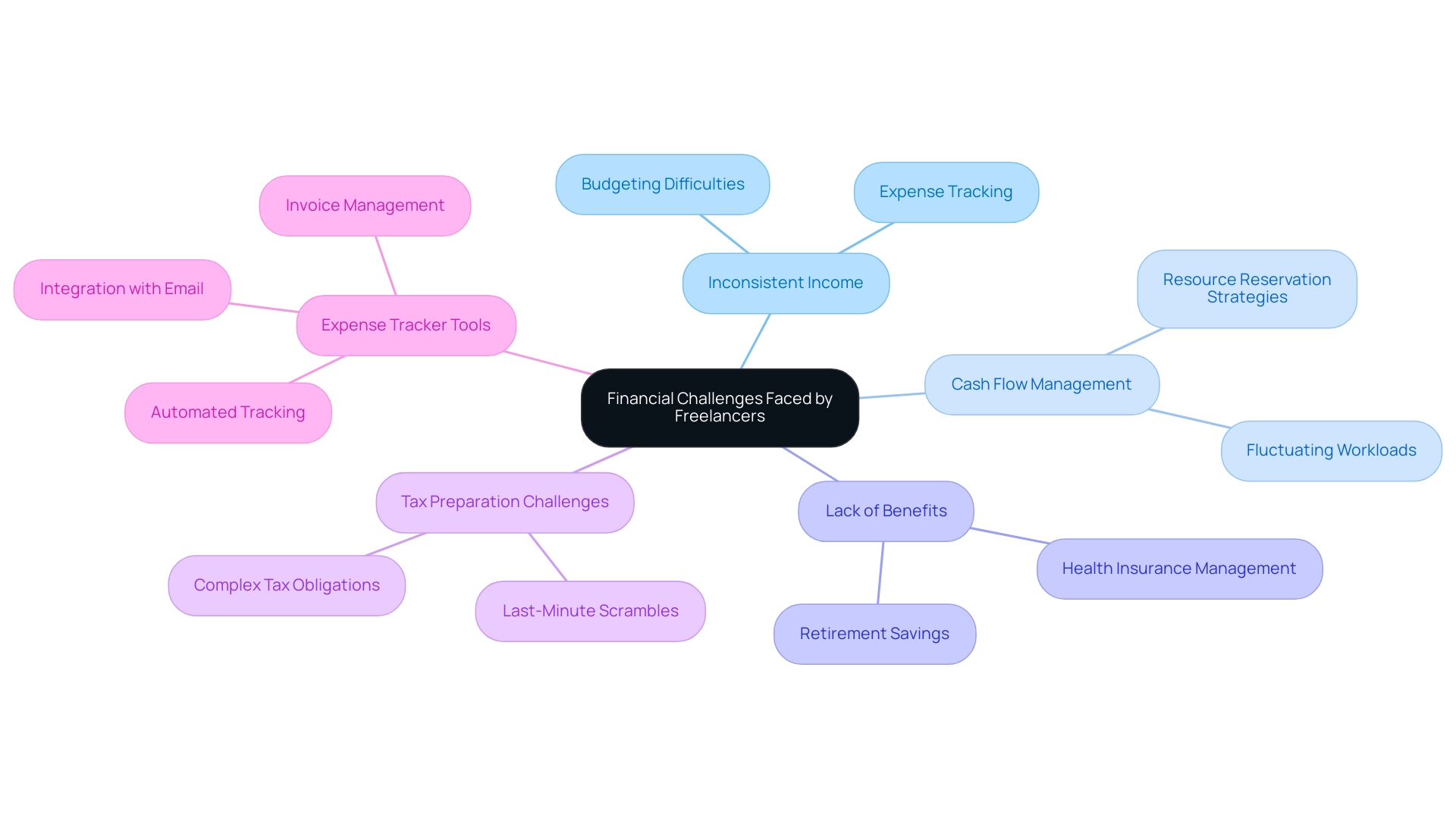
Essential Features to Look for in an Expense Tracker
When selecting an expense tracker, independent workers often face significant challenges in managing their finances. Prioritizing features such as automated receipt scanning, real-time spending categorization, and seamless integration with accounting software can alleviate these concerns. An effective expense tracker empowers users to effortlessly capture receipts on-the-go, automatically categorize costs, and generate comprehensive reports for tax purposes. Essential functionalities, including bank account integration and mobile accessibility, simplify the expense tracking process, allowing individuals to manage their finances with ease.
Platforms that excel in automated invoice processing and intelligent reconciliation significantly reduce the time independent workers spend on bookkeeping tasks. These platforms enable users to connect multiple email accounts, effortlessly collecting and categorizing invoices from both work and personal accounts, thereby enhancing the user experience through centralized invoice management. Furthermore, by linking their bank accounts, freelancers can instantly align costs with bank transactions, improving the accuracy of their financial records.
As Georgi Knyazhev notes, "Kulud has transformed my accounting processes, allowing me to save time and streamline communication with my accountants." This automation not only enhances efficiency but also minimizes the risk of errors, a common concern in manual financial management. Indeed, manual reimbursement processes can lead to delayed reimbursements, high error rates, and increased fraud risks, underscoring the importance of adopting automated solutions.
Moreover, the growing trend toward automation in expense tracker usage is evident in the increasing demand for features that facilitate real-time expense categorization. By utilizing advanced technology, the company allows independent workers to effortlessly request missing invoices and provides step-by-step guidance to obtain them from various applications, streamlining their money management. Additionally, the platform's collaborative features enable users to invite accountants or bookkeepers, fostering improved communication and oversight of monetary activities.
As independent workers navigate their financial obligations, access to tools that simplify these tasks can be transformative. The automated cost management system not only assists in maintaining precise records but also enables independent professionals to focus on their core business activities.
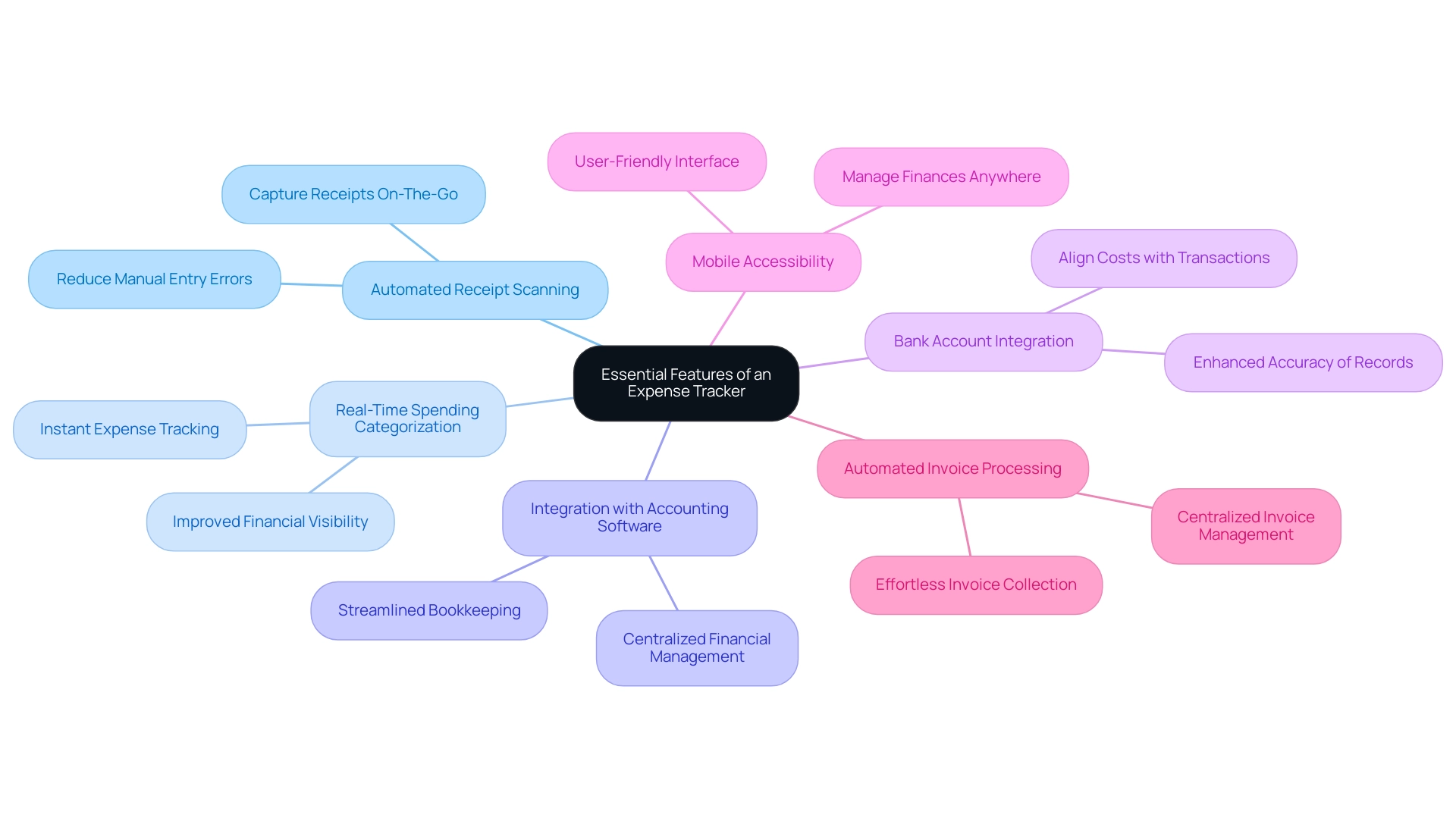
Best Practices for Maximizing Your Expense Tracker's Potential
Independent workers often face challenges in effectively managing their expenses, which can lead to stress and confusion. To address these concerns, utilizing an expense tracker like Kulud can be a game changer. By establishing a consistent routine for updating financial records—ideally on a daily or weekly basis—freelancers can ensure that all monetary transactions are recorded in real-time. This structured approach significantly reduces the risk of overlooking costs or misplacing receipts. Furthermore, consistently classifying expenses is essential; it fosters transparency in financial records and simplifies the examination of spending trends.
Kulud's automated categorization feature further streamlines this process, ensuring that costs are organized efficiently. In addition to this, regular evaluations of cost reports empower freelancers to identify trends, enabling informed monetary decisions that align with their business objectives. Incorporating features such as alerts for unusual spending patterns or reminders for submitting costs can further optimize the tracking process. The platform's multi-email support allows users to connect different accounts, centralizing invoices from all sources. Its automated invoice extraction and bank transaction matching features illustrate how technology can enhance operational efficiency, saving time and improving accuracy in financial management.
Statistics indicate that independent workers who update their expense records regularly experience a 40% increase in efficiency, akin to advancements seen in industries like automotive manufacturing. As Georgi Knyazhev noted, "the transformative impact of the system on their accounting processes allows them to save time and streamline communication with their accountants." By creating a routine and fully utilizing the available features—including the capability to effortlessly request missing invoices and automate bank matching—freelancers can optimize their management potential, allowing them to focus more on expanding their businesses.
Moreover, it is essential to concentrate on metrics that align with business goals rather than obsessing over every statistic, ensuring a strategic approach to financial management. For those considering the platform, it offers a free trial to explore its features, with pricing starting at €0.15 per invoice after the initial 50 invoices processed per month. This means that freelancers can experience firsthand how Kulud can transform their expense management practices.
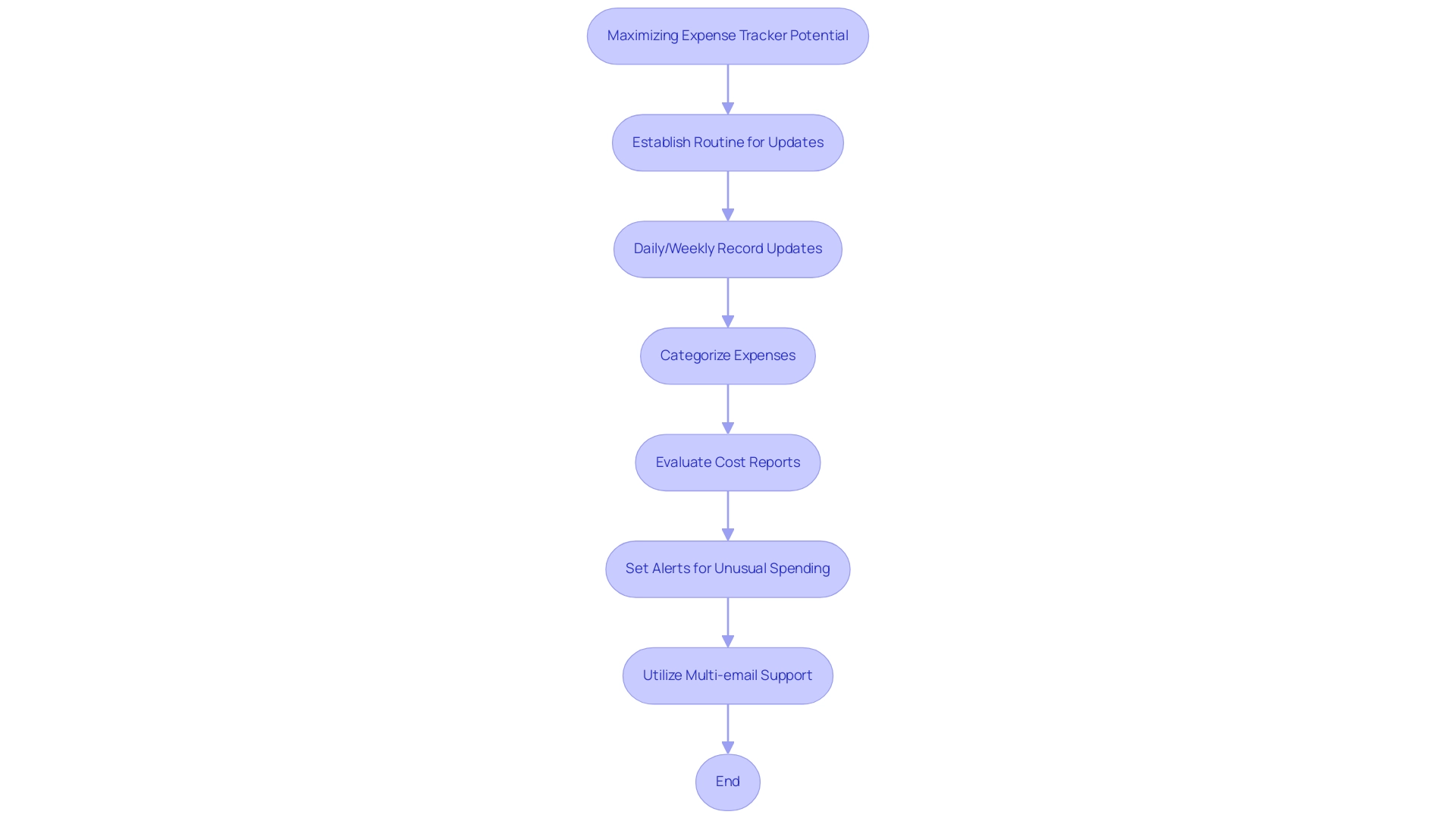
Leveraging Automation to Simplify Expense Management
Automation has significantly transformed financial management, particularly for independent workers who often juggle multiple responsibilities. Many freelancers express concerns about managing expenses effectively. By utilizing tracking software that automates receipt scanning and categorization, independent workers can greatly reduce the time dedicated to bookkeeping and minimize the potential for errors. The platform simplifies the process of locating and extracting receipts directly from users' inboxes, allowing freelancers to focus on their core work rather than becoming overwhelmed by administrative duties.
Furthermore, the automated reconciliation of bank transactions ensures that all expenses are accurately aligned, offering a comprehensive view of financial health without the burden of manual data entry. This capability is especially important, given that 34% of U.S. respondents voice apprehensions regarding the risks associated with automation. The company addresses these concerns by providing a reliable expense tracker that enhances both efficiency and accuracy in expense management.
In addition to this, Kulud enables users to effortlessly request missing invoices and offers step-by-step guidance for retrieving them from various applications, further streamlining the bookkeeping process. The collaborative features allow independent workers to invite and collaborate with accountants or bookkeepers, improving communication and facilitating strategic decision-making.
The benefits of automation extend beyond mere time savings; they empower independent workers to maintain precise financial records while focusing on business growth. As industry experts note, by 2026, an impressive 80% of finance departments will have integrated AI platforms capable of processing large datasets. The company is strategically positioned within this trend, delivering automated receipt scanning that not only simplifies expense tracking but also enhances overall financial management with an effective expense tracker.
Pricing options are designed with freelancers in mind, offering a trial that processes 20 invoices and receipts, alongside a Pro plan that accommodates 50 invoices per month at a competitive rate. User testimonials, including insights from Georgi Knyazhev, highlight the transformative impact of the service on their accounting processes, stating, "Instead of spending 3 hours each month searching for and collecting invoices, I now spend just 5 minutes." This feedback illustrates how the platform fosters smoother communication with accountants and supports more strategic decision-making.
In this rapidly evolving landscape, embracing automation is not merely beneficial; it is essential for independent workers striving to succeed in a competitive market. By leveraging platforms like Kulud, users can effectively navigate the trends of digital transformation while harmonizing technological innovation with human expertise.
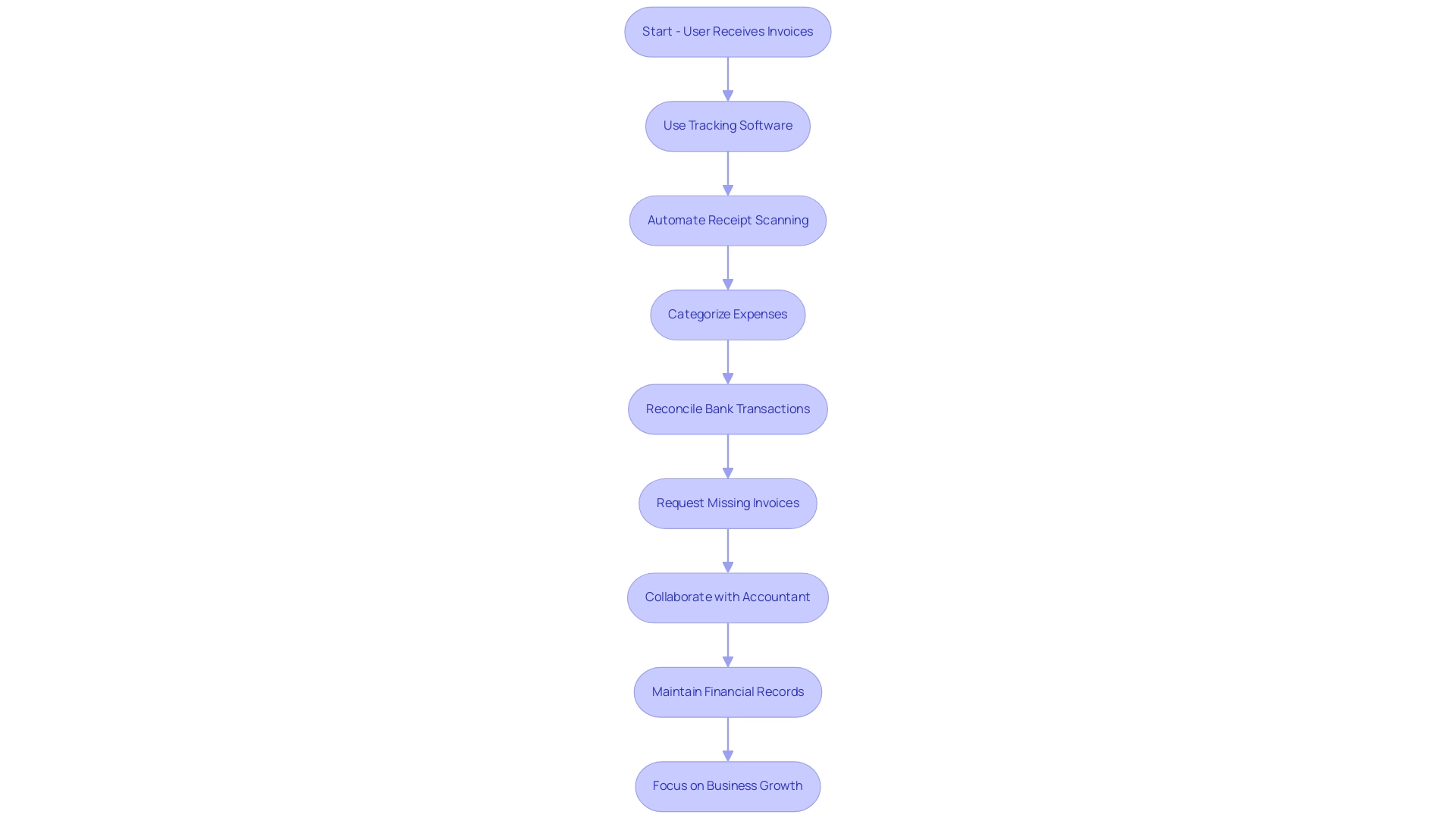
Ensuring Data Security in Your Expense Tracking Practices
Data security is a paramount concern for freelancers who utilize an expense tracker for managing costs. To safeguard sensitive financial information, it is crucial to select management software that incorporates robust encryption protocols, secure login methods, and undergoes regular security audits. This platform exemplifies such standards with its advanced encryption and secure login features, ensuring that user data remains confidential and protected.
The implementation of two-factor authentication significantly enhances protection against unauthorized access, making it a critical feature for any expense management solution.
In addition to security, the company offers automated categorization and email analysis, streamlining the bookkeeping process for freelancers. By automatically identifying and extracting receipt information from emails, the system saves users valuable time that would otherwise be spent on manual data entry. This efficiency is further emphasized by user testimonials, such as Georgi Knyazhev's, who states, "Kulud has transformed my accounting processes, allowing me to save time and streamline communication with my accountants."
Freelancers should also conduct periodic reviews of their expense tracker practices to ensure compliance with evolving data protection regulations and to mitigate the risk of data breaches. In 2025, the cybersecurity landscape is projected to grow to $212 billion, underscoring the increasing importance of security measures in all digital transactions. Moreover, the prevalence of phishing attacks, which account for more than a third of cyberattacks, emphasizes the necessity for independent workers to remain vigilant.
Furthermore, the monetary implications of inadequate security measures are significant, as data breaches through ransomware have cost sectors like education more than $53 billion in downtime over five years. By prioritizing data security, independent workers not only safeguard their monetary records but also cultivate trust with their clients, ensuring a secure and dependable business environment. Kulud's successful completion of the Cloud Application Security Assessment (CASA) and its innovative leadership in cost management further reinforce its commitment to security and affordability.
By adopting these best practices, independent workers can effectively protect their monetary information and concentrate on expanding their businesses.
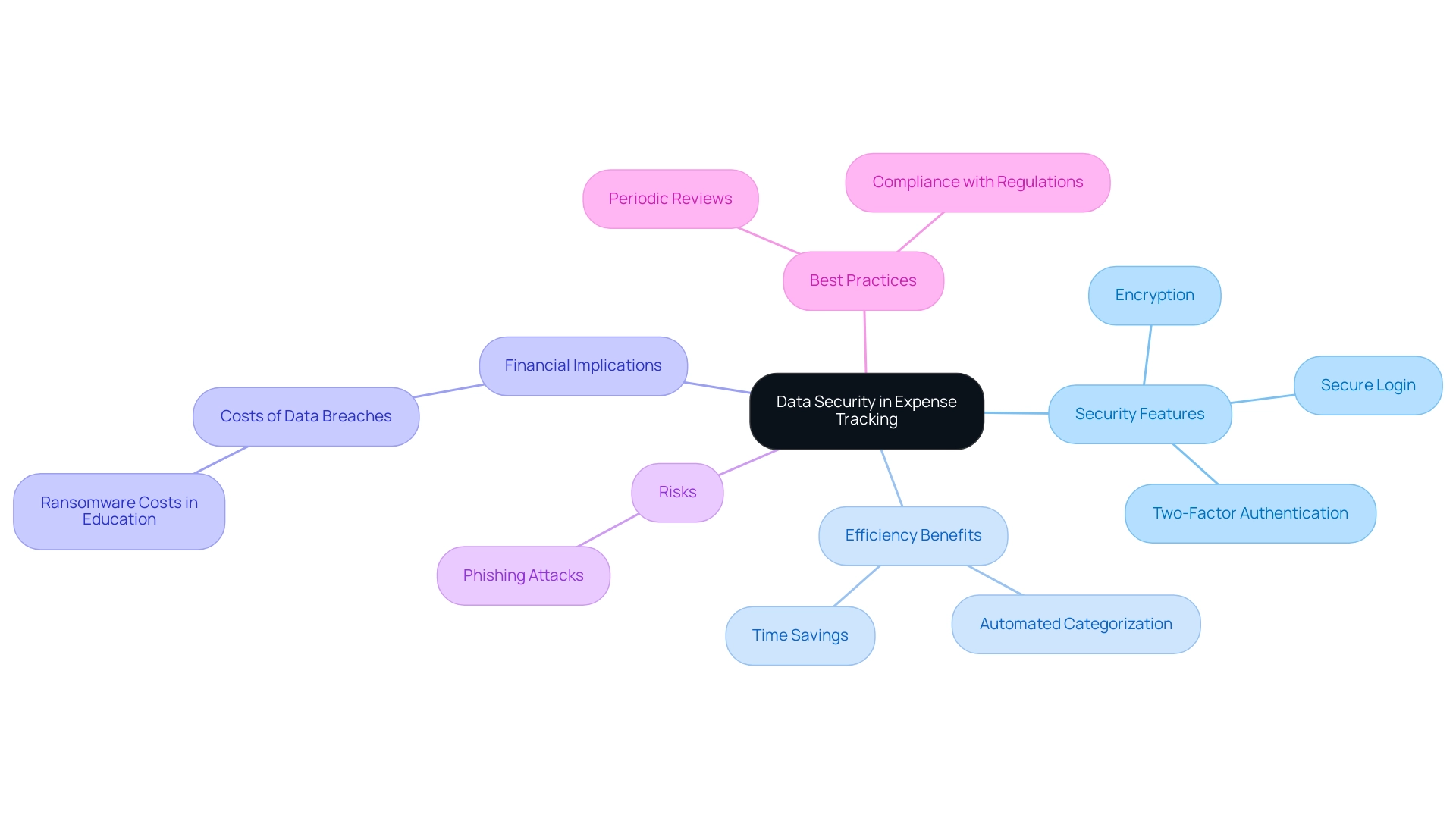
Actionable Tips for Effective Expense Management
To optimize expense management, freelancers often face common concerns that can feel overwhelming. However, by adopting actionable strategies, they can simplify their financial processes and reduce stress.
-
Separate Personal and Business Expenses: This fundamental practice simplifies tracking with an expense tracker for tax preparation, ensuring that records are clear and organized. By maintaining distinct accounts, freelancers can avoid the confusion that often arises from mixing personal and business transactions.
-
Utilize a Dedicated Business Bank Account: Establishing a separate bank account for business transactions simplifies money management. This division not only helps in monitoring costs but also improves professionalism and trustworthiness with clients and vendors.
-
Regularly Review and Categorize Expenses: Using an expense tracker for consistent monitoring and categorization of expenses is crucial for maintaining clarity in financial records. This practice enables independent workers to identify spending patterns and make informed decisions about their finances.
-
Set a Budget and Monitor Progress: An expense tracker can help freelancers create a budget to avoid overspending and ensure that they allocate resources effectively. Consistently assessing budget performance can result in enhanced monetary discipline and better cash flow management.
-
Keep Digital Copies of Receipts: Storing digital copies of receipts reduces physical clutter and ensures easy access during tax season. This practice not only saves time but also minimizes the risk of losing important documents.
-
Leverage Technology for Automation: Utilizing platforms like similar services can significantly enhance expense management through the use of an expense tracker that automates the tracking and categorization of expenses. With features such as automated invoice and receipt capture, seamless bank integration, and business email login, this platform allows freelancers to streamline their financial processes. Users can link their bank accounts, allowing the system to match invoices with transactions automatically, and easily export data to their accounting software. As Emily J., a tax consultant, noted, "The software has transformed how I work with clients. I spend less time on admin tasks and more time adding value to their businesses." Thomas H. also shared, "Matching invoices with transactions used to take hours. With Kulud, it's automated and accurate, saving me and my clients so much time."
By applying these tactics, independent workers can notably improve their resource management practices, ultimately aiding the success and longevity of their enterprises. The significance of distinguishing personal and business costs cannot be emphasized enough; studies show that freelancers who uphold clear separations in their monetary records experience less stress during tax preparation and are better situated for economic growth. Furthermore, as businesses transition towards generating actionable insights from financial data, adopting these best practices will be essential for navigating the complexities of expense management in 2025.
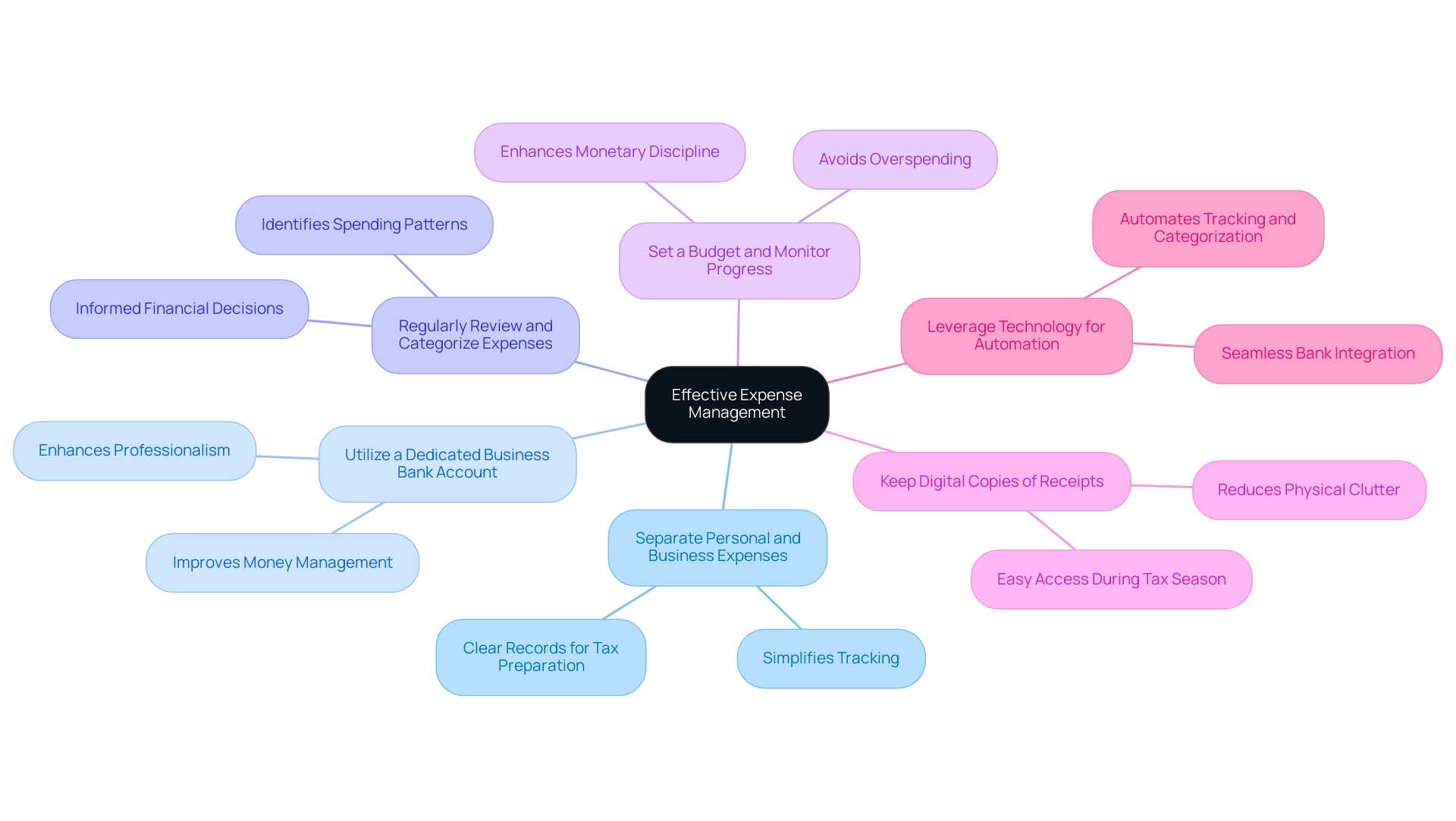
Conclusion
Effective financial management is crucial for freelancers and small business owners navigating the complexities of the gig economy. It is essential to recognize the common concerns freelancers have regarding expense management, particularly the significance of meticulous expense tracking as a means to achieve financial stability. By utilizing innovative tools like Kulud, freelancers can streamline their expense management processes, automate tedious tasks, and gain valuable insights into their financial health.
Freelancers face unique financial challenges, such as inconsistent income and the absence of employer-sponsored benefits. These factors necessitate proactive cash flow management strategies. Understanding these challenges and leveraging robust expense tracking tools can empower freelancers to make informed financial decisions. This ultimately leads to enhanced profitability and business sustainability.
When choosing an expense tracker, it is important to prioritize essential features such as automated receipt scanning, real-time categorization, and seamless integration with accounting software. Establishing best practices for expense tracking, such as regular reviews and the separation of personal and business expenses, allows freelancers to optimize their financial management processes.
As the freelance market continues to grow, so does the necessity for effective expense management. By embracing automation and prioritizing data security, freelancers can protect their financial information while focusing on what they do best—delivering exceptional work and driving their businesses toward success. With the right tools and strategies in place, financial stability and growth are well within reach. We encourage you to explore these solutions and take proactive steps to enhance your financial management.



